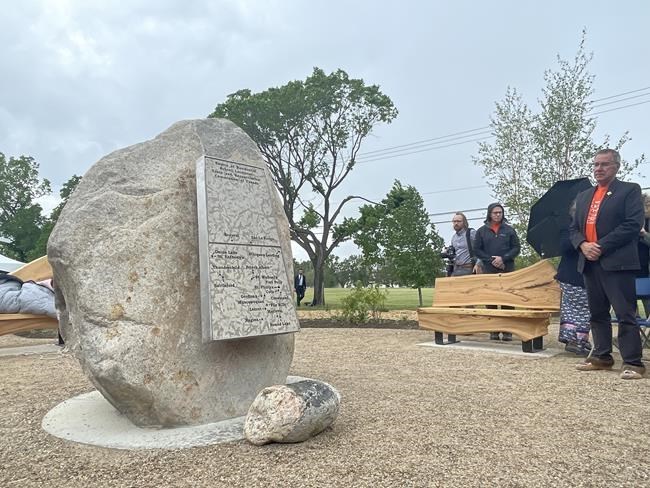REGINA — On the longest day of the year, communities across Canada embraced National Indigenous People's Day by celebrating the contributions of First Nations, Inuit and Metis peoples.
The Summer solstice is a time of spiritual significance for many Indigenous peoples and the day offered the opportunity to learn about their culture.
"We want to share what we know and learned over the years, including our history," Saskatchewan Lt.-Gov. Russ Mirasty, who is a member of the Lac La Ronge Indian Band, said Tuesday.
Mirasty helped unveil a personal project of his in Regina: one of Canada's first provincial monuments dedicated to residential schools.
It's a direct response to one of the Truth and Reconciliation Commission Calls to action, which recommends installing a publicly accessible, highly visible residential school memorial in each capital city.
He said he hopes other provinces follow suit.
"We need a lasting place where people can come remember, reflect, pray and think about what residential schools did to our country and specifically Indigenous peoples," he said.
The memorial draws from natural elements native to Saskatchewan. A rock in the middle of the circular garden features a map of the province detailing where every former residential school was. Below it is a smaller rock for smudging, and benches nearby for people to reflect or pray.
For others across Canada, the day was about highlighting the resilience of Indigenous peoples as the country faces a reckoning with its own history tied to recent findings of unmarked graves linked to former residential schools.
Kahsennenhawe Sky-Deer, grand chief of Kahnawake, a Mohawk territory near Montreal, said the discoveries across the country are a chance to show “our strength and our courage in the face of so much adversity and (to demonstrate) that our languages and our culture are still there.”
“Make Indigenous languages the first language you teach your children, not French or English,” Sky-Deer said at a celebration in Montreal's Old Port.
"Be proud of who you are."
Communities in cities like Winnipeg spent the day coming together with feasts, dancing and ceremonies -- a change from celebrations that had moved online the past two years due to the COVID-19 pandemic.
In Regina, famous Indigenous TikTok stars like Conway Kootenay left the screen behind to meet with people in person.
But that didn't stop some virtual celebrations from taking place.
Google Canada honoured the day by creating a Norval Morriseau-inspired doodle illustrated by Anishinaabe guest artists Blake Angeconeb and Danielle Morrison. Also known as Copper Thunderbird, Morriseau was an artist from Bingwi Neyaashi Anishinaabek First Nation whose work paved the way for Indigenous art to become mainstream.
For Ted Quewezance, a residential school survivor from Keeseekoose First Nation in Saskatchewan, the day was about finding happiness with what the Creator has given.
"Our Creator has given us our language, our pipes, our teachings, our ceremonies. And they have given us our languages," he said. "It's a spiritual gift. It wasn't given to us by man."
From the coast of British Columbia to the cobblestone streets of Quebec, politicians across the country used the day to renew their commitment to reconciliation.
At an event in Ottawa, Prime Minister Justin Trudeau acknowledged Canada's history of trying to erase Indigenous identity, adding it is important to find moments that celebrate the country's diverse cultures.
"Nothing can stop Indigenous Peoples," he said.
Manitoba Keewatinowi Okimakanak Grand Chief Garrison Settee echoed the same sentiment that connected those who celebrated the day: "We are proud of our languages and traditions that keep our cultures alive."
This report by The Canadian Press was first published June 21, 2022.
-- With files from Pierre Saint-Arnaud in Montreal, Brittany Hobson in Winnipeg and Stephanie Taylor in Ottawa.
Mickey Djuric, The Canadian Press


